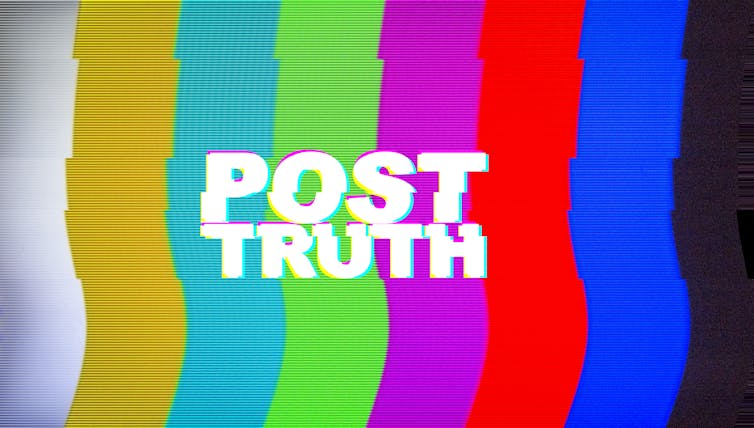If I wrote “The first sentence in this article is a lie”, is this sentence true, or is it a lie? And, if a liar declares “I am lying”, is the liar telling the truth? In philosophy and logic this is known as the Liar’s Paradox: the liar is a liar, and if the liar is indeed lying, then the liar is telling the truth, which means the liar just lied.
Lies are part of the DNA of modern society, though we often now refer to them with the more dignified terminology of marketing, advertising, propaganda or spin. From unscrupulous sellers of used cars to prime ministers making unsubstantiated declarations about weapons of mass destruction, it seems that many people now make a living from lies.
In the public imagination politicians are professional liars par excellence, or as the writer George Orwell once put it: “Political language … is designed to make lies sound truthful and murder respectable.”
Read more: Why people vote for politicians they know are liars
In her essay Truth and Politics, published in The New Yorker in 1967, the philosopher Hannah Arendt was already lamenting the fact that politics and truth don’t mix. But even Arendt was aware that not all lies are the same. There are lies that are minimal forms of deception, a micro-tear in the fabric of reality, while some lies are so big that they require a complete rearrangement of the whole factual texture, a shift to another reality. In today’s terminology, Arendt was alerting us to the difference between a lie, and the 2016 Oxford Dictionaries Word of the Year – “post-truth”.
One way to understand the difference between lies and post-truth, which I’ve written about in a new paper, is that a liar denies specific facts that have precise coordinates in space and time, whereas post-truth questions the very nature of truth. A liar knows the truth, and, by trying to persuade us of an alternative narrative, a liar is paradoxically honouring the truth, whereas post-truth allows no last refuge for the truth.
Clinton versus Trump
This distinction between a lie and post-truth becomes more clear by comparing two recent American presidents, Bill Clinton and Donald Trump. At a White House press conference on January 26 1998, Clinton famously said:
I want to say one thing to the American people. I want you to listen to me. I’m going to say this again: I did not have sexual relations with that woman, Miss Lewinsky. I never told anybody to lie, not a single time; never.
Clinton’s statement, given the subsequent revelations and a semen-stained blue dress, is disconcerting. It’s possible that Clinton did not consider his intimate interactions with Lewinsky as a “sexual relation”, but that is unlikely – it would require a phenomenal effort of self-deception, or ingenuity, to defend that position with honesty and integrity. Clinton was impeached for perjury and obstruction of justice, because he lied under oath, but he was ultimately acquitted in a Senate trial.
Subverting truth itself
Clinton lied, and that was inexcusable. But Trump’s relationship with truth is even more disturbing, and dangerous. Trump’s incessant accusations of fake news against the main media outlets, including the Washington Post, The New York Times, and CNN, reflects a longstanding disdain for the truth. Unlike Clinton, Trump is not simply denying certain facts, instead he is determined to undermine the theoretical infrastructure that makes it possible to have a conversation about the truth.
Trump’s response and demeanour to the impeachment allegations made against him is a typical example of post-truth. By spurning the impeachment proceedings as a “charade” and a “witch-hunt”, his strategy is to create an environment where objective facts are less influential in shaping public opinion, where theoretical frameworks necessary to make sense of certain events are scorned, and where scientific truth is delegitimised.
Read more: What to think when you’re thinking about impeachment: 5 essential reads
This is the major difference between a lie and post-truth. While a lie subverts a specific truth, post-truth tries to subvert truth itself. Trump’s abhorrence of truth is reflected in the remarkable claim by one of his lawyers, Rudy Giuliani, that “truth is relative”. Giuliani was talking on NBC News about the request by special counsel Robert Mueller for an interview with Trump regarding the Russia investigation. Giuliani raised concerns that Trump could perjure himself because “truth isn’t truth.”
 More devious than a lie. BNMK 0819/Shutterstock
More devious than a lie. BNMK 0819/Shutterstock
Post-truth is a murky concept, but it should not be confused with a lie. Post-truth is much more devious and dangerous to the democratic fabric of our society. The prefix “post” in post-truth refers to the claim that a specified idea has become redundant and therefore can safely be discarded. Post-truth is the belief that truth is no longer essential, that truth has become obsolete.
We can cope with politicians lying, but we cannot afford the risk of allowing politicians to deligitimise truth.
Source: World Politics - www.independent.co.uk


